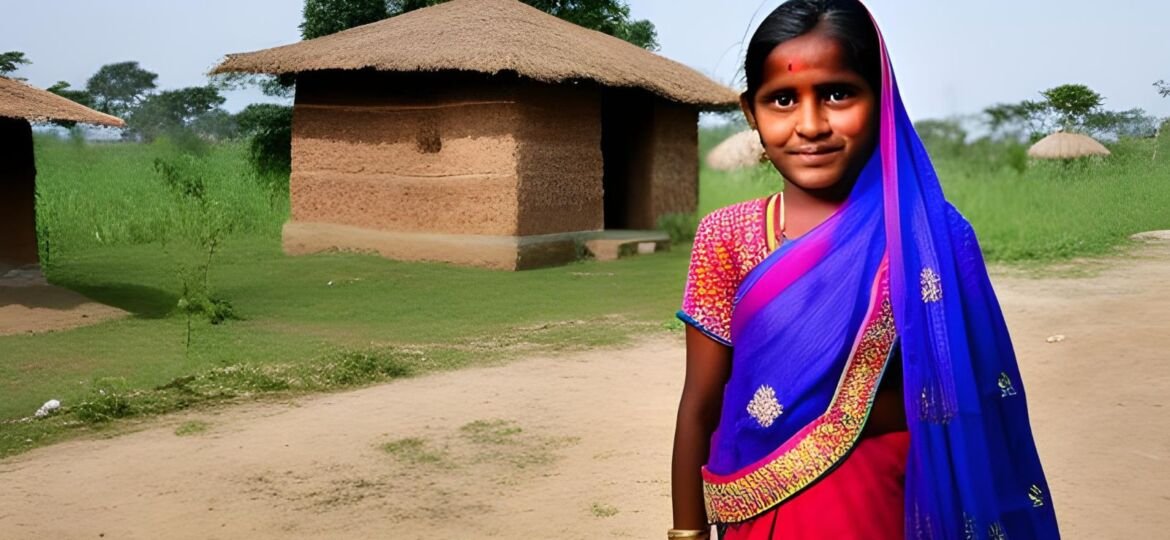
Author: Mallika Sinha
This blog presents a comprehensive case study from ground zero that sheds light on the issue of sexual and gender-based violence within the context of Tanu (12)’s lived experience in the slum clusters of Uttam Nagar, Delhi. We explore the profound impact of intimate partner violence on Tanu’s journey and examine how Protsahan’s H.E.A.R.T approach to protect girls’ rights and promoting their well-being plays a pivotal role in addressing this critical issue by uncovering the complexities, finding solutions, and empowering survivors towards a brighter future putting healing at its core.
Tanu lives with her parents in the slum clusters of Uttam Nagar, Delhi where economic hardships and social challenges persistently affect the community. Her father, a ragpicker, is the only earning member of the family. He is an alcoholic and regularly inflicts violence on Tanu’s mother. Her mother, in her attempts to prevent the escalation of conflicts and abuse within their household, further becomes a victim of physical and sexual violence and aggression.
One night, with the usual violence at its peak at home perpetuated by her father, Tanu in a moment of courage, took a decisive action to disrupt the cycle of violence in her home. She disconnected the power supply of her home, immediately prompting her father to venture out and investigate the cause. Remarkably, this interruption temporarily halted the domestic violence that had continuously plagued their lives.
Tanu’s simple action highlighted the mindful resilience that children and adolescents can exhibit in the face of adversity if trained well in bystander intervention strategies. Tanu’s remarkable actions reflect the insightful strategies of bystander intervention that she intuitively employed:
- Notice the incident of violence: Aware of the escalating violence, Tanu recognized the urgent need for intervention within her own home.
- Interpret the situation as a problem: Understanding the detrimental impact of the ongoing violence, she saw it as a critical issue that required immediate action.
- Breaking the cycle of violence by assuming responsibility: Taking matters into her own hands, without causing any threat or harm to her own safety or that of her mother, Tanu embraced her responsibility to break the cycle of violence and create a safer environment for herself and her mother.
- Have the skills to intervene: Strategically disconnecting the power supply, Tanu utilized her knowledge from the Protsahan training to employ a non-confrontational method that would temporarily diffuse the situation and allow time and space to seek help.
- Intervene: With unwavering determination, Tanu courageously intervened, using her chosen strategy to disrupt the violence and provide respite for herself and her mother in that peak moment of violence and indignity.
Tanu has been coming to Protsahan’s Girl Empowerment Center for the past 2 years. Protsahan’s Crisis Intervention Officers have been providing psycho-social counselling to Tanu and her mother consistently along with critical support services of academic support, financial scholarship and robust life skills training in after-school community programs in the GEC (girl empowerment center). A comprehensive approach encompassing prevention, protection, linkages, counselling and support services is necessary (as embodied in the organization’s H.E.A.R.T model) to ensure the well-being and safety of vulnerable individuals like Tanu and her mother.

Protsahan’s Role and Intervention Strategies: Lessons Learnt
- Tanu’s story showcases the resilience and resourcefulness of children and adolescents, especially when equipped with bystander intervention strategies over a period of time with robust support systems around. Their ability to notice, interpret, assume personal responsibility, know how to help, and step up empowers them to challenge discrimination and violence.
- Protsahan’s role in addressing intimate partner violence is comprehensive and involves collaborating with local stakeholders, such as Aaganwadis and slum Panchayats, to implement sustainable solutions within urban slum clusters. These interventions include supporting adolescents through a long-term resilience program that involves continued retention in school until they successfully finish education, tuition support, linkages to government welfare schemes, community dialogues involving men and boys along with stakeholders like police, anganwadis and mahila panchayats, violence prevention trainings and psychosocial support. The organization’s Crisis Intervention Officers provide consistent counselling and guidance to survivors, fostering healing and well-being through direct access to financial and psychosocial aid.
- By prioritizing prevention, protection, and support services, Protsahan is creating a safe and inclusive environment for vulnerable individuals like Tanu and her mother, without them being pushed to shelter homes or institutionalization. The commitment of the team to safeguarding rights and promoting well-being at such hyperlocal levels is leading to sustainably breaking the cycle of violence and empowering survivors towards a safer future.

